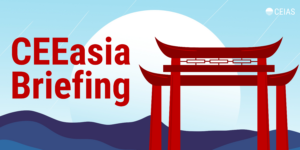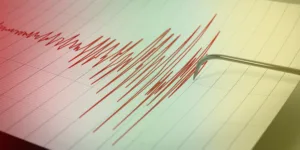Welcome to the 26th issue of the #CEEasia Briefing.
In this issue we dissect the following topics:
- Sino-Russian Joint Statement on Ukraine
- Slovenia-Taiwan Relations
- Japan Is Ready to Help Europe with Gas Supplies
If you like what you see, please forward this message to your friends and colleagues who can subscribe here.
Do you need to know more about East Asia? Don’t hesitate to shoot us a message about custom analysis tailored to your needs.
1. Sino-Russian Joint Statement on Ukraine
What’s going on? China and Russia expressed support for each other amidst the increasing military tensions in eastern Ukraine, as Xi Jinping and Vladimir Putin signed a joint statement on the sidelines of the Beijing Winter Olympics at the beginning of February. Not only does the statement oppose further enlargement of NATO and formation of security blocs in the Asia Pacific, but it also criticizes the West for its “Cold War approaches.”
Going deeper… In the statement, both leaders declared “no limits” to friendship and cooperation between the two countries. Even though it does not mention Ukraine by name, an implicit reference to the current crisis can be found as the document condemns “attempts by external forces to undermine security and stability in China’s and Russia’s adjacent regions.” Besides expressing concerns over the trilateral security pact between Australia, the US and the UK (AUKUS) and opposition to Taiwanese independence, both countries pledged their commitment to deepen cooperation and safeguard “international fairness and justice” together.
This means… Although China has avoided getting involved in European security issues before, the joint statement indicates growing solidarity between the signatories and efforts to somewhat coordinate their opposition to the US-led network of alliances. Since it marks a significant shift in Beijing’s strategy when it comes to its relations with Europe and support for Russia’s security concerns, Chinese analysts call for cautiousness. On one hand, China might benefit from the conflict in Ukraine as it turns Europe’s attention away from Asia, but on the other, as full-on invasion followed Putin’s decision to recognize the independence of Ukraine’s easternmost breakaway territories , the conflict may also have serious economic consequences for China.
Further reading:
POLITICO: Russia, China call for halt to NATO enlargement
The Guardian: Xi and Putin urge Nato to rule out expansion as Ukraine tensions rise
SCMP: Russia-Ukraine crisis: China urged to weigh economic costs of Moscow coalition as sanction threats mount
Russian invasion of Ukraine – Assessing Chinese reaction
On 24 February, Russia invaded neighboring Ukraine, in breach of international law and guarantees provided to Ukraine upon the dissolution of the former Soviet Union. As the crisis was unfolding, with Ukrainians under President Zelensky heroically defending their homeland, and global democracies mounting unprecedented sanctions against Putin’s regime, the world has also been keenly observing how China will react to the Russian aggression.
Here, you can find some of our observations of the situation:
Denník N: Môže Čína dotlačiť Putina k tomu, aby zastavil vojnu? Pekingu aktuálna situácia vyhovuje (with comments by Matej Šimalčík)
RTVS: Z prvej ruky 1.3.2022 (discussion with Barbara Kelemen and Matej Šimalčík)
Denník N: Analytik: Neviem si predstaviť, čo by mohla byť pre Čínu červená čiara vo vojne na Ukrajine. Silno sa priviazala k Putinovi (interview with Filip Šebok)
Asia Times: EU, US response to Russia puts China on Taiwan notice (with comments by Richard Q. Turcsányi)
CEIAS: Asia Dispatch – Čínsky postoj k vojne na Ukrajine (podcast with Filip Šebok, moderated by Martin Šebeňa)
CEIAS: Chinese Media Watch – In Chinese media and amongst netizens, Russia’s invasion finds understandings (media analysis by Klára Dubravčíková)
China Talk: How Eastern Europe sees China and the war in Ukraine (podcast with Matej Šimalčík).
2. Slovenia as CEE’s Newest Taiwan Ally?
What’s going on? During his country’s presidency of the Council of the EU, Slovenia’s Prime Minister Janez Janša presented himself as one of the staunchest supporters of Lithuania in its ongoing dispute with China, repeatedly voicing the need for a more united EU China policy. During his January interview with an Indian broadcaster, Janša again drew international attention to Slovenia’s foreign policy, as he hinted at exchanging representative offices with Taiwan. This prompted many to suggest the possibility of Slovenia following Lithuania in adopting a more hawkish stance on China.
Going deeper… In a quick attempt at damage control, the Minister of Foreign Affairs Anže Logar confirmed that Slovenia would follow the established tradition by having Taiwan’s representative office in Ljubljana bearing the name “Taipei”. It was therefore not the prospect of Taiwan’s office in Slovenia that was at the core of China’s backlash (albeit it certainly played a role) this time around, as any possible damage caused by this decision was further ameliorated by the National Assembly’s affirmation of Slovenia’s adherence to the EU’s One-China policy. Rather, it was Janša’s reference to Taiwan as a country and his suggestion of support for any decision reached by the Taiwanese public regarding the island nation’s future legal status that provoked Beijing’s ire.
This means… Whilst Taiwan’s Ministry of Foreign Affairs expressed gratitude for Janša’s unwavering support, the prime minister’s remarks prompted a domestic backlash, which, as suggested by a Slovenian Taiwan scholar Saša Istenič in her interview with the Global Taiwan Institute, was even greater than that of Beijing. It came not only from the opposition, in particular the Social Democrats, but also the business sector, with the Slovenian-Chinese Business Council immediately reporting several contract terminations. The Lithuanian example was brought up as a warning sign, especially the possibility of exclusion of Slovenian products from the supply chains of other EU companies.
This is… noteworthy, as although the direct trade between Slovenia and China is negligible, and so is the Chinese FDI stock in the country, the exclusion from broader supply chains could cause significant damage to Slovenia’s economy. The push for closer Slovenian-Taiwanese relations is therefore coming solely, or at least predominantly, from Janša, who could be motivated by the country’s upcoming parliamentary election, and is not a representation of a wider national consensus. Indeed, as suggested by Istenič, the shift on China and Taiwan will firstly need to come from the EU.
Further reading:
CHOICE: Sino-Slovenian Relations Off to a Rocky Start in 2022
SCMP: Slovenia tries to head off row with Beijing over Taiwan office
VoA: Slovenian Trade Group Reports Chinese Backlash After PM Praises Taiwan
GTI Insights: A Conversation with Saša Istenič on Slovenia’s Growing Relationship with Taiwan
3. Japan Is Ready to Help Europe with Gas Supplies
What’s going on? With growing tensions over the war in Ukraine, Hagiuda Koichi, Japan’s Minister of Economy, Trade and Industry, announced that Japan was ready to help European states with their LNG supplies. Such help would come in the event of a significant or complete reduction in Russian gas supplies to Europe. This poses a threat to the EU, which imports up to 38% of its natural gas from Russia. Nevertheless, there are significant differences between its various member states, with the eastern states getting up to 100% of their gas supplies from Russia, as in the case of the Czech Republic or Latvia.
Going deeper… Japan, which until recently was the largest LNG importer in the world, is willing to provide part of its reserves. However, as both state and private sector LNG stocks are currently estimated to last three weeks, minister Koichi refused to specify how much gas he is ready to send to Europe. He stressed that it is crucial to maintain stable supplies for the Japanese economy and population, whilst simultaneously stating that it was the United States and European partners who had helped Japan with its own gas supplies after the devastating tsunami in 2011.
This means… In 2014, Japan joined the states that sanctioned Russia in response to the latter’s occupation of Crimea, doing so despite the fact that one of the ambitions of former Prime Minister Abe Shinzo was to improve relations between the two countries. The current government of Prime Minister Fumio Kishida has imposed sanctions on Russia’s recognition of independence for Ukraine’s separatist regions of Luhansk and Donetsk, thus preventing Russian bonds from being issued in Japan. Bank accounts of several Russian individuals have also been frozen and they have been banned from entering Japan.
Further reading:
CNA: Japan offers gas to Europe over Ukraine fears
Reuters: Japan imposes sanctions on Russia over actions in Ukraine
The Diplomat: Amid Ukraine Crisis, Japan Toughens Stance on Russia








